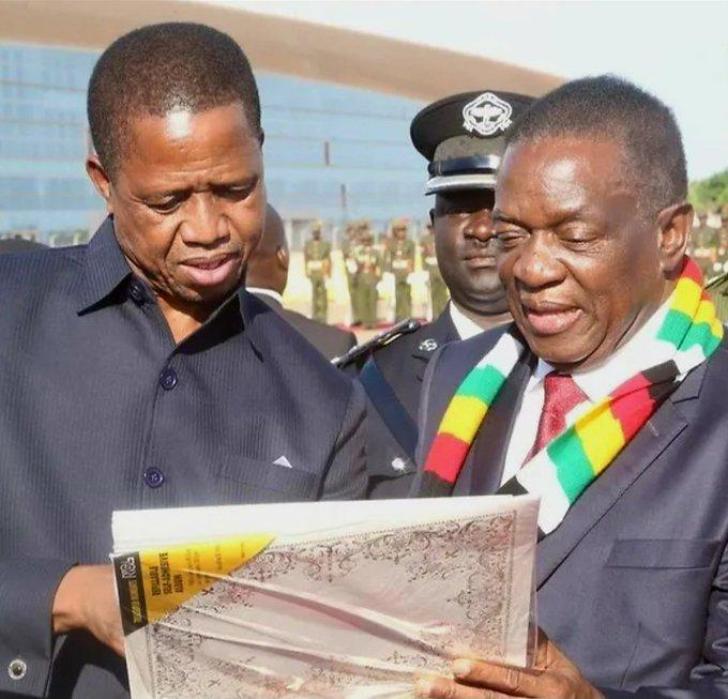News / National
Mnangagwa suffers setback in Zambia
11 Dec 2024 at 13:22hrs |
0 Views

Zimbabwean President Emmerson Mnangagwa has encountered a significant political setback in the region after Zambia's Constitutional Court barred his ally, former President Edgar Lungu, from contesting the 2026 presidential election.
The ruling disqualified Lungu, 68, citing Zambia's constitutional two-term limit, reversing earlier judgments that had allowed him to stand in previous elections. Lungu, a key opposition figurehead and candidate for the emerging Tonse Alliance, was widely seen as a major contender to challenge incumbent President Hakainde Hichilema, a regional adversary of Mnangagwa.
Mnangagwa, who has personal and political ties to Zambia, has long viewed the country's political dynamics as critical to his interests. Having grown up in Zambia, Mnangagwa's connection to the nation adds a layer of complexity to his geopolitical strategies. His relationship with Lungu, a fellow strongman, has been pivotal in counterbalancing Hichilema's regional influence.
Hichilema, who leads Zambia, has clashed with Mnangagwa on multiple fronts. As chair of the Southern African Development Community's (SADC) organ on politics, defence, and security cooperation, Hichilema played a central role in rejecting Mnangagwa's controversial re-election in 2023. The SADC's extraordinary summit in Angola endorsed findings that Zimbabwe's election lacked credibility, straining relations between the two leaders.
Lungu's political trajectory has been fraught with legal and electoral disputes. First elected in January 2015 to complete the term of his predecessor, Michael Sata, who died in office, Lungu narrowly won re-election in 2016. His tenure was marred by allegations of electoral irregularities, which his main rival, Hichilema, vehemently contested.
In his bid for the 2026 election, Lungu argued that his initial 20-month term should not count toward the constitutional limit. However, the Constitutional Court dismissed this argument, ruling that Lungu had been “twice elected and has twice held office,†making him ineligible for future presidential contests.
This decision overturned earlier rulings that had favored Lungu, including one that permitted his participation in the 2021 elections, which he lost to Hichilema.
Lungu's disqualification is a blow to Mnangagwa's regional ambitions. Lungu's Tonse Alliance candidacy was expected to mount a formidable challenge to Hichilema, whose administration has adopted a tough stance against corruption and emphasized democratic reforms.
Analysts suggest that the ruling further isolates Mnangagwa in the region, as Hichilema's growing influence within SADC continues to challenge autocratic tendencies in southern Africa.
With Lungu out of the race, the 2026 Zambian election dynamics are poised to shift. The ruling has sparked debate in Zambia and beyond about the use of constitutional term limits to consolidate democratic principles.
For Mnangagwa, the ruling underscores the challenges of maintaining influence in a region increasingly resistant to authoritarian governance. As the Zimbabwean leader navigates these shifting dynamics, his position in SADC politics appears increasingly precarious.
The ruling disqualified Lungu, 68, citing Zambia's constitutional two-term limit, reversing earlier judgments that had allowed him to stand in previous elections. Lungu, a key opposition figurehead and candidate for the emerging Tonse Alliance, was widely seen as a major contender to challenge incumbent President Hakainde Hichilema, a regional adversary of Mnangagwa.
Mnangagwa, who has personal and political ties to Zambia, has long viewed the country's political dynamics as critical to his interests. Having grown up in Zambia, Mnangagwa's connection to the nation adds a layer of complexity to his geopolitical strategies. His relationship with Lungu, a fellow strongman, has been pivotal in counterbalancing Hichilema's regional influence.
Hichilema, who leads Zambia, has clashed with Mnangagwa on multiple fronts. As chair of the Southern African Development Community's (SADC) organ on politics, defence, and security cooperation, Hichilema played a central role in rejecting Mnangagwa's controversial re-election in 2023. The SADC's extraordinary summit in Angola endorsed findings that Zimbabwe's election lacked credibility, straining relations between the two leaders.
Lungu's political trajectory has been fraught with legal and electoral disputes. First elected in January 2015 to complete the term of his predecessor, Michael Sata, who died in office, Lungu narrowly won re-election in 2016. His tenure was marred by allegations of electoral irregularities, which his main rival, Hichilema, vehemently contested.
This decision overturned earlier rulings that had favored Lungu, including one that permitted his participation in the 2021 elections, which he lost to Hichilema.
Lungu's disqualification is a blow to Mnangagwa's regional ambitions. Lungu's Tonse Alliance candidacy was expected to mount a formidable challenge to Hichilema, whose administration has adopted a tough stance against corruption and emphasized democratic reforms.
Analysts suggest that the ruling further isolates Mnangagwa in the region, as Hichilema's growing influence within SADC continues to challenge autocratic tendencies in southern Africa.
With Lungu out of the race, the 2026 Zambian election dynamics are poised to shift. The ruling has sparked debate in Zambia and beyond about the use of constitutional term limits to consolidate democratic principles.
For Mnangagwa, the ruling underscores the challenges of maintaining influence in a region increasingly resistant to authoritarian governance. As the Zimbabwean leader navigates these shifting dynamics, his position in SADC politics appears increasingly precarious.
Source - online
Join the discussion
Loading comments…




















